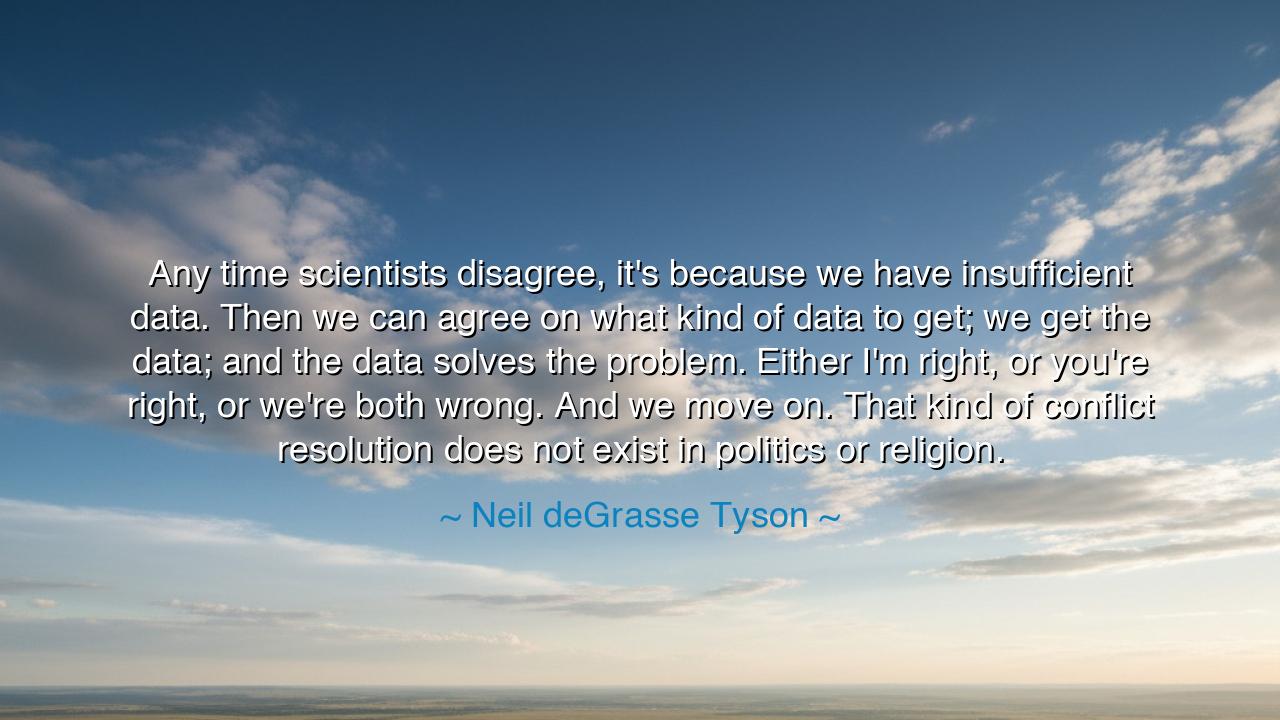
Any time scientists disagree, it's because we have insufficient
Any time scientists disagree, it's because we have insufficient data. Then we can agree on what kind of data to get; we get the data; and the data solves the problem. Either I'm right, or you're right, or we're both wrong. And we move on. That kind of conflict resolution does not exist in politics or religion.






“Any time scientists disagree, it's because we have insufficient data. Then we can agree on what kind of data to get; we get the data; and the data solves the problem. Either I'm right, or you're right, or we're both wrong. And we move on. That kind of conflict resolution does not exist in politics or religion.” — so declared Neil deGrasse Tyson, the modern voice of reason and the herald of the cosmos. In these words lies not merely the reflection of a scientist, but the lament of a philosopher who gazes upon the human condition and sees both its brilliance and its blindness. His wisdom reminds us that truth is not born from opinion, but from evidence, and that true humility is found not in holding tightly to belief, but in releasing it when the light of discovery shines upon it.
Tyson’s words emerge from the heart of the scientific spirit, that noble pursuit which began when man first looked up at the stars and asked, Why? Science, he tells us, is not a field of pride but of progress — a discipline where disagreement is not destruction but dialogue, and where argument is not war, but the forging of understanding. When scientists clash, they do so not to conquer, but to uncover. Their quarrels are temporary, for both stand before the same altar of truth, waiting for the evidence — the data — to pronounce judgment. In this way, science is not chaos, but harmony through humility: the recognition that no single mind owns the truth, but that all may approach it, step by step, together.
Consider the story of Albert Einstein and Niels Bohr, two titans of thought whose debates shaped the soul of modern physics. Einstein, the great realist, could not accept the indeterminacy of quantum theory; Bohr, the visionary, embraced it. Their exchanges were fierce and relentless, yet always grounded in mutual respect. And in time, the universe itself spoke — through experiment, through evidence, through data — revealing that both were partly right, and partly wrong. But from their disagreement arose a deeper understanding of reality than either could have reached alone. In that, Tyson’s truth is fulfilled: science moves forward because it listens to the universe, not to pride.
In contrast, Tyson warns that politics and religion, when misused, often lack this self-correcting power. Where science seeks evidence, they too often seek certainty; where science invites doubt, they too often fear it. In these realms, disagreement becomes division, and division breeds bitterness. For when one believes not only that one is right, but that one must always be right, truth becomes chained, and reason is cast out. Thus, the wisdom of Tyson is not an attack upon faith or governance, but a plea for the humility that both have forgotten — the humility to admit when we are wrong, and the courage to seek what is right, not for our glory, but for truth’s sake.
Yet even in the ancient world, there were those who lived by this sacred balance. The philosopher Socrates taught his students that wisdom begins in ignorance — that to know the truth, one must first confess, I do not know. His method, like that of modern science, was one of questioning, of dialogue, of discovery through reason. For this devotion to truth over tradition, he was condemned. But his death became a beacon, reminding all future seekers that the love of truth demands courage against conformity. Tyson’s words echo that same defiance — a call to live by inquiry, not by fear.
What Tyson offers us, then, is not a lesson only for scientists, but for all who live and think. When you encounter conflict — in ideas, in relationships, in nations — ask not, Who is right?, but What is true? When you disagree, do not sharpen your tongue, but sharpen your methods. Seek the data, the evidence, the experience that can illuminate what emotion conceals. For in truth, as in nature, light does not destroy darkness; it reveals what was hidden within it. If humanity could learn to argue like scientists — to disagree without hatred, to be proven wrong without shame, to move forward together — then the world itself might finally evolve as the universe intended: toward understanding.
So, my child, let this be your lesson: build your beliefs upon evidence, not ego. Listen not to those who shout the loudest, but to those who seek the clearest. And when you find yourself certain, pause — for certainty is often the enemy of wisdom. Like the scientist, stand before the unknown with reverence and patience. Admit what you do not yet know, and pursue it with all the fire of your soul. For in the end, the measure of truth is not victory in argument, but harmony with reality.
And thus, as Tyson teaches, let your heart be a laboratory and your mind a telescope. Seek the truth wherever it hides, and when it reveals itself, bow before it — even if it humbles you. For in the dialogue between ignorance and discovery lies the noblest of all human callings. Science teaches us to move on; life demands that we learn to do the same.






AAdministratorAdministrator
Welcome, honored guests. Please leave a comment, we will respond soon